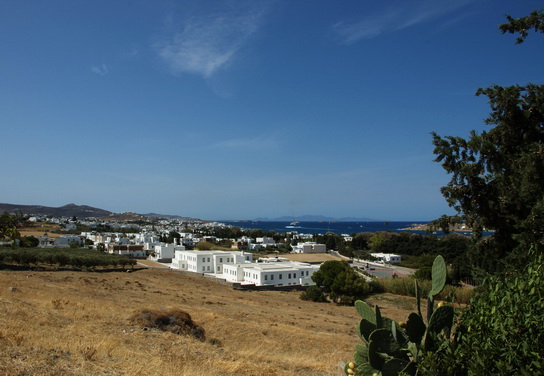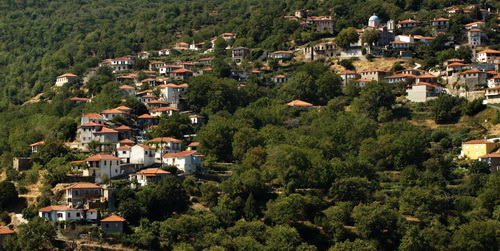Question words in Modern Greek Posted by Ourania on Jul 2, 2014 in Vocabulary
Question words are placed at the beginning of the sentence. Sometimes their use is confusing because some of them are declined, i.e. they have singular and plural, genders and cases. Note that we use the Greek question mark: ;
1. Ποιος, ποια, ποιο (pios, pia, pio): who, which
Ποιος είναι αυτός ο άντρας; (pios ine aftos o andras) Who is this man?
Ποια είναι η αδερφή σου; (pia ine i aderfi sou) Who is your sister?
Ποιο είναι το ποτήρι σου; (pio ine to potiri sou) Which one is your glass?
2. Ποιον, ποια, ποιο (pion, pia, pio): whom, which
Με ποιούς πήγες σινεμά; (me pious piges sinema) With whom did he go to the movies?
3. Πού (pou): where
Πού είναι η παραλία; (pou ine i paralia) Where’s the beach?
4. Πότε (pote): when
Πότε θα πας στους συγγενείς σου; (pote tha pas stous sigenis sou) When will you visit your relatives?
5. Πώς (pos): how
Πώς ήρθες; (pos irthes) How did you get here?
6.Τίνος (tinos): whose
Τίνος είναι αυτά τα χρήματα; (tinos ine afta ta hrimata) Whose is this money?
In oral speech we use:
Ποιανού, ποιανής, ποιανού (pianou, pianis, pianou)
Ποιανής είναι αυτή η φούστα; (pianis ine afti I fousta) Whose is this skirt?
Ποιανού είναι αυτό το αυτοκίνητο; (pianou ine afto to aftokinito) Whose is this car?
7. Τι (ti): what
Τι θέλεις να πιεις; (ti thelis na piis) What would you like to drink?
8. Γιατί (yati):why
Γιατί δεν έρχεσαι μαζί μας; (yati den erhese mazi mas) Why don’t you come with us?
9. Πόσος, πόση, πόσο (poson, posi, poso): how much, how many. It refers to the subject.
Πόσος κόσμος είναι εδώ; (posos kosmos ine edo) How many people are here?
10. Πόσον, πόση, πόσο (poson, posi, poso): how much, how many
Πόσες μέρες θα μείνετε; (poses meres tha minete) How many days will you stay?
11. Πόσο μακριά (poso makria): how far
Πόσο μακριά είναι το χωριό; (poso makria ine to horio) How far is the village?
12. Πόσων χρονών (poson hronon): how old
Πόσων χρονών είσαι; (poson hronon ise) How old are you?
13. Πώς και… (pos kai): how come
Πώς και δεν ήρθε η Μαίρη μαζί σου; (pos kai den irthe I Mairi mazi sou) How come Mary didn’t come with you?
14. Πώς κι έτσι (pos ki etsi): how come
“Του χρόνου θα πάω στην Ελλάδα.” (Tou hronou tha pao stin Ellada) next year I’ll go to Greece.
“Πώς κι έτσι;” (Pos ki etsi) How come?
15. Μήπως (mipos): it means maybe but it’s used in questions only. It cannot be translated in english. Do not confuse it with “ίσως” (isos, maybe) which is used in affirmative cases.
Μήπως ξέρετε που είναι το φαρμακείο; (mipos xerete pou ine to farmakio) Do you know where’s the pharmacy?

Build vocabulary, practice pronunciation, and more with Transparent Language Online. Available anytime, anywhere, on any device.
About the Author: Ourania
Ourania lives in Athens. She holds a degree in French Literature and a Master’s degree in Special Education for Children. Since 2008, she has been teaching Greek to foreigners.






Comments:
Georgia:
Isn’t mipos translated as per chance? Per chance do you know where the pharmacy is?
Ourania:
@Georgia Yes, it can be translated as “per chance”.
leo wilke:
does the definite article “the” ever proceed a verb in the greek during the Koine period?
Thank you very much.
Leo
Ourania:
@leo wilke In classical Greek,the article “the” (το) proceeds infinitives (e.g.Τὸ σιγᾶν κρεῖττόν ἐστι τοῦ λαλεῖν) but the koine language doesn’t have infinitives. I’m not an expert though, so maybe you should ask someone else too 🙂
gopika:
‘is that u’ hw can i translate in greek-english
Ourania:
@gopika Is that you? = Εσύ είσαι; (Esee eese)
Mart Mosic:
Thank you for this explanation of question words in Greek.
Jayne:
Your site is very helpful. Efharisto
Ourania:
@Jayne Thank you for your interest.